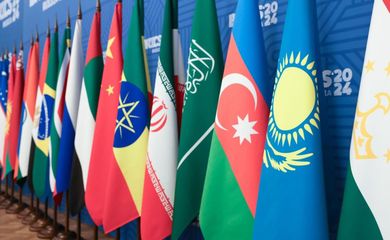BRICS should enhance use of local currencies among member countries

Brazilian Foreign Minister Mauro Vieira will open two days of preparatory meetings for the BRICS Heads of State Summit on Tuesday (Feb. 25). A special session featuring a speech by President Luiz Inácio Lula da Silva may take place on the second day of the event.

The meetings will introduce Brazil's priorities as BRICS chair to the group's "sherpas" (a term of Tibetan origin referring to mountain guides). Alongside the promotion of local currencies for financial transactions, five other key priorities will be discussed: healthcare cooperation; financing climate change mitigation efforts; BRICS trade, investment, and finance; artificial intelligence governance; and the bloc’s institutional development. These topics will be refined in the lead-up to the BRICS Heads of State Summit on July 6 and 7 in Rio de Janeiro.
BRICS, under Brazil’s rotating presidency since January 1, aims to expand the use of local currencies for trade and investment transactions among its member countries. This initiative seeks to lower the costs of commercial and financial operations within the bloc, which includes Brazil, Russia, India, China, South Africa, Egypt, the United Arab Emirates, Saudi Arabia, Ethiopia, and Iran.
The priorities of Brazil’s BRICS presidency were announced on Friday (21) by Mauricio Lyrio, Secretary of Economic and Financial Affairs at the Ministry of Foreign Affairs, during a press briefing in Brasília. Lyrio, who serves as Brazil’s chief BRICS negotiator, has been appointed to lead the work of the sherpas.
The secretary explained that the use of local currencies "has been evolving within BRICS since 2015, and we continue to make progress, especially since it is already common in bilateral trade among member countries. Several members already conduct trade in their local currencies, and this practice will persist during Brazil’s presidency," he said.
Common currency
Mauricio Lyrio clarified that BRICS is not currently discussing the creation of a common currency. "There are no agreements on the matter, and the process itself is highly complex. These are large economies, and this is not an easy issue to manage. Naturally, there are other ways to reduce operating costs, which align with BRICS' internal dynamics," he added.
The secretary also stated that the decision not to discuss a common currency is unrelated to remarks made by international authorities. Recently, US President Donald Trump threatened BRICS member countries with 100 percent tariffs on their imports if the bloc pursued alternatives to the dollar in international transactions.
The diplomat did not rule out the possibility of BRICS heads of state discussing the adoption of a common currency in the future. "There is nothing preventing the presidents from considering this possibility in the long term," he stated.






